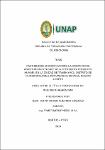| dc.contributor.advisor | Mori Pinedo, Eymer | |
| dc.contributor.author | Guevara Vásquez, Johny Royer | |
| dc.date.accessioned | 2019-05-02T15:17:36Z | |
| dc.date.available | 2019-05-02T15:17:36Z | |
| dc.date.issued | 2019 | |
| dc.identifier.uri | http://repositorio.unapiquitos.edu.pe/handle/20.500.12737/6071 | |
| dc.description.abstract | La investigación se realizó en la en la ciudad de Tamshiyacu, con el objetivo de determinar la factibilidad económica del agroturismo en base a la producción sostenible de humarí.
Se hizo un estudio de la demanda, dirigida a los visitantes nacionales o internacionales teniendo en cuenta una proporción del 80%, cuyos resultados fueron la base para el estudio técnico, que nos permitió diseñar el producto turístico. Así mismo se hizo el estudio ambiental, con el propósito de estructurar medidas de mitigación a los posibles impactos producidos al medio como consecuencia del proyecto y finalmente se determinó la factibilidad económica – financiera, con el fin de precisar la viabilidad del proyecto y definir su manejo para lograr la rentabilidad.
Del análisis económico financiero efectuado al proyecto turístico, se concluye que es económicamente rentable, porque el resultado de la evaluación nos dice que se obtiene un VALOR ACTUAL NETO (VAN) de $242,908.51 es > a 0, por lo que el proyecto es económicamente viable. La TASA INTERNA DE RETORNO (TIR) es de 53.42% se demuestra que la rentabilidad del proyecto es mayor que la tasa de descuento (18.53%). El PERIODO DE LA RECUPERACION DE LA INVERSION (PRI) es a los 5 años, 3 meses y 14 días, con una relación B/C = $2.17>1, por cada $ 1.00 invertido se recupera $2.17 en promedio.
La adopción del agroturismo en base a la oferta del producto humari mejorará las condiciones económicas de las familias de la ciudad de Tamshiyacu así como también los Operadores de Turismo de los albergues ubicados en la zona de Tamshiyacu, ampliaran sus servicios al encontrar atractivos innovadores en el Campamento Agroturístico. | es_PE |
| dc.description.abstract | The investigation was conducted in the city of Tamshiyacu, with the objective of determining the economic feasibility of agrotourism based on the sustainable production of humari.
A study of the demand was made, aimed at national or international visitors taking into account a proportion of 80%, whose results were the basis for the technical study, which allowed us to design the tourism product. Likewise, the environmental study was carried out, with the purpose of structuring mitigation measures to the possible impacts produced to the environment as a consequence of the project and finally the economic - financial feasibility was determined, in order to specify the viability of the project and define its management to achieve profitability.
From the economic and financial analysis carried out on the tourism project, it is concluded that it is economically profitable, because the result of the evaluation tells us that a NET VALUE OF VALUE (VAN) of $ 242,908.51 is obtained> 0, so the project is economically viable. The INTERNAL RETURN RATE (IRR) is 53.42%, which shows that the profitability of the project is greater than the discount rate (18.53%). The PERIOD OF THE RECOVERY OF INVESTMENT (PRI) is at 5 years, 3 months and 14 days, with a ratio B / C = $ 2.17> 1, for every $ 1.00 invested it recovers $ 2.17 on average.
The adoption of agrotourism based on the offer of the humari product will improve the economic conditions of the families of the city of Tamshiyacu as well as the tourism operators of the shelters located in the Tamshiyacu area, will expand their services by finding innovative attractions in the Agrotourism Camp. | es_PE |
| dc.description.uri | Tesis | es_PE |
| dc.format | application/pdf | es_PE |
| dc.language.iso | spa | es_PE |
| dc.publisher | Universidad Nacional de la Amazonía Peruana | es_PE |
| dc.rights | info:eu-repo/semantics/openAccess | es_PE |
| dc.rights | Attribution-NonCommercial-NoDerivs 3.0 United States | * |
| dc.rights.uri | http://creativecommons.org/licenses/by-nc-nd/3.0/us/ | * |
| dc.source | Universidad Nacional de la Amazonía Peruana | es_PE |
| dc.source | Repositorio institucional - UNAP | es_PE |
| dc.subject | Turismo | es_PE |
| dc.subject | Agricultura | es_PE |
| dc.subject | Humarí | es_PE |
| dc.subject | Pouraqueiba sericea | es_PE |
| dc.subject | Estudios de factibilidad | es_PE |
| dc.title | Factibilidad económica para la adopción de agroturismo en base a la oferta del producto Humarí, en la ciudad de Tamshiyacu, distrito de Fernando Lores, provincia de Maynas, región Loreto. | es_PE |
| dc.type | info:eu-repo/semantics/bachelorThesis | es_PE |
| thesis.degree.discipline | Agronomía | es_PE |
| thesis.degree.grantor | Universidad Nacional de la Amazonía Peruana. Facultad de Agronomía | es_PE |
| thesis.degree.level | Título Profesional | es_PE |
| thesis.degree.name | Ingeniero Agrónomo | es_PE |
| thesis.degree.program | Regular | es_PE |
| dc.subject.ocde | Agricultura | es_PE |
| dc.subject.ocde | http://purl.org/pe-repo/ocde/ford#4.01.01 | es_PE |


